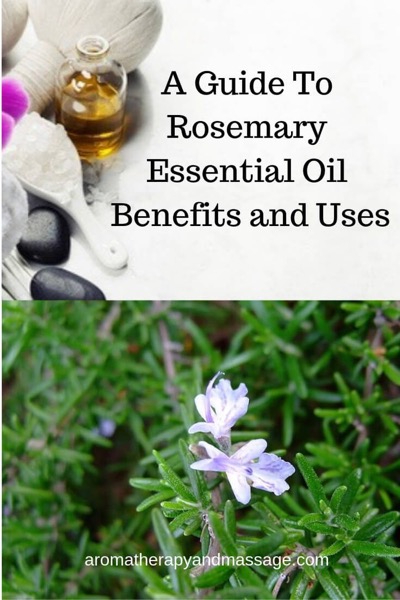- Home
- Essential Oil Profiles
- Rosemary Essential Oil
As an affiliate for Bookshop, Amazon, and other programs, I may earn a small commission for products purchased through links. This doesn't affect the price you pay. Privacy policy and disclosures.
Search this site:
Guide to Rosemary Essential Oil Benefits and Uses
The fragrance of rosemary essential oil "enables the human spirit to receive and understand the assistance descending to us from wiser beings," writes aromatherapist Valerie Ann Worwood in Aromatherapy For the Soul. "Rosemary helps us remember who we are and what our place is in the evolutionary plan."
Worwood says the emotional benefits of rosemary (Salvia rosmarinus / Rosmarinus officinalis) are to encourage energy, upliftment, confidence, clarity, concentration, stability, purification, and awareness.

Basic Rosemary Facts
Plant family: Lamiaceae/Labiatae
Production: Steam distilled from the leaves and flowers/buds of the rosemary plant.
Aroma: Fresh, camphorous, herbaceous.
Perfume/Aromatic note: Middle
Chemotypes
Rosemary is available in variations called chemotypes.
That is, the chemical composition of the oil varies depending on growing
conditions. Thus the predominant effects of the essential oil differ by
chemotype. The three most common chemotypes are:
- Rosemary camphor (Rosmarinus officinalis ct. camphor) has a distinct camphor aroma.
- Rosemary verbenone (Rosmarinus officinalis ct. verbenone) contains less camphor and the aroma is more herbaceous. Generally considered the gentlest chemotype.
- Rosemary cineole (Rosmarinus officinalis ct. 1,8–cineole) is sometimes preferred for use in respiratory and circulatory issues.
Other chemotypes include borneol, bornyl acetate, beta-myrcene, and alpha-pinene.
Is rosemary safe to use during pregnancy? No, according to Aromatherapy and Massage For Mother and Baby. Do not use while breastfeeding.
Is rosemary essential oil safe for children? Do not apply to or near the faces of babies or children, according to Essential Oil Safety. For the harsher
chemotypes, some sources recommend not using with children under age 10.
Cautions:
- Many sources recommend not using rosemary if you have epilepsy.
- Rosemary essential oil is often adulterated and diluted. When buying this oil pay close attention to its source.
- Some sources state not to use the essential oil if you have high blood pressure, but not everyone agrees. Aromatherapy expert Robert Tisserand writes, "The action of rosemary oil may depend on its relative concentrations of 1,8-cineole and camphor, but there is no convincing evidence that it is hypertensive," in Proof of Safety: Challenges Facing Essential Oil Therapy. If you are concerned and want to use rosemary, monitor your blood pressure to see what happens.
Main components:
Camphor chemotype
camphor 17.0–27.3%
1,8-cineole 17.0–22.5%
alpha-pinene 4.4–22.0%
1,8-cineole chemotype
1,8-cineole 39.0–57.7%
camphor 7.4–14.9%
alpha-pinene 9.6–12.7%
Verbenone chemotype
camphor 11.3–14.9%
verbenone 7.6–12.3%
alpha-pinene 2.5–9.3%
1,8-cineole 0–9.0%
Borneol chemotype: 1,8-cineole 20.0%, bornel 15.6%, camphor 15.3%
Bornyl acetate chemotype: alpha-pinene 24.0–28.5%, bornyl acetate 11.5–14.3%, 1,8-cineole 6.8–13.6%, camphor 9.9–10.4%
Source: Essential Oil Safety, 2nd Edition
Rosemary Aromatherapy Benefits
Aromatherapy: A Complete Guide to the Healing Art: "Rosemary is one of the best stimulants for the nervous system, adrenal glands, digestion, and poor circulation." Rosemary essential oil skin benefits include helping sluggish, underactive skin; dry, mature skin; and couperose complexions. Other benefits of this essential oil include helping reduce cellulite, dermatis, scars, inflammation, dandruff, hair loss, and varicose veins. The scent may also improve memory, confidence, perception, and creativity.
For specific chemotypes, the book gives this information:
- Borneol type: helps overcome fatigue and infectons, a heart tonic.
- Camphor type: vein decongestant, cardiac tonic, diuretic
- Cineol type: helps relieve lung congestion and chronic fatigue
- Verbenone type: helps relieve sinus infections, helps balance endocrine and nervous systems, useful for oily and regenerative skin care
The Heart of Aromatherapy: Rosemary ct. camphor is good for respiratory support, soothing allergies, clearing mucous and congestion, reducing swelling, soothing sore muscles, encouraging circulation, relieving headaches, promoting a feeling of energy, and supporting mental focus and clarity.
The Complete Book of Essential Oils and Aromatherapy: Uses for rosemary essential oil include helping relieve muscle and joint pain (including
arthritis), muscle injury, headaches, and a feeling of heaviness in the
legs. The essential oil may also help with respiratory conditions, sinus
congestion, cellulite, memory improvement, acne, boils, abscesses,
dandruff, and hair loss.
Advanced Aromatherapy: The Science of Essential Oil Therapy: The camphor chemotype helps with neuromuscular problems and releases tension. The cinoele chemotype is stimulating and promotes digestion. The verbenone chemotype is regenerating for the skin and reduces mucus.
Aromatherapy For Healing the Spirit: In Traditional Chinese Medicine, rosemary is warm, pungent, and stimulating. The essential oil is a tonic for yang energy, promotes the circulation of Qi-energy and blood, energizes the Qi-energy of the heart. "Reinforcing the Heart and empowering the Mind (Shen), rosemary oil helps to boost the confidence and morale of those who lack faith in their own potential." The oil's energy is warm and dry and rosemary's main element is fire.
Aromatica: A Clinical Guide to Essential Oil Therapeutics, Volume I: Psychologically, rosemary aromatherapy benefits are to stimulate the mind and promote alertness, motivation, and self-confidence. Physically, the essential oil restores, stimulates, and warms hypotonic/weak and asthenic/cold conditions. In Traditional Chinese Medicine the essential function of the oil is to tonify the Qi, warm the interior, and strengthen the Shen.
- The rasa (taste) of rosemary is pungent and bitter, the vipaka (aftertaste) is pungent, and the virya (energy) is heating and drying.
- The oil decreases vata and kapha and increases pitta.
- Tissues most affected by the oil are muscle, blood, plasma, skin, nerve, heart, and endocrine.
- Indications for this essential oil include liver ailments, gallbladder inflammation, flu, colds, asthma, rheumatism, poor memory, weak ego, blemished skin, dandruff, and hair loss.
Subtle Aromatherapy: Rosemary oil is a psychic protector.
The Essential Guide to Aromatherapy and Vibrational Healing: Use rosemary to awaken your spiritual consciousness. The oil brings mental clarity and sharpness and can help deflect negativity and jealousy.
Aromatherapy and Subtle Energy Techniques: Rosemary clears, cleanses, strengthens, motivates, and energizes. The oil is especially useful for the sixth chakra to clear the mind, enhance memory, and protect you from negative influences.
Mixing Essential Oils for Magic: Use rosemary in ceremonies to remember those who have died. The oil's memory-enhancing properties make it useful for dreamwork and past-life work. The cleansing properties clear negativity before magic, ritual, or healing work.
Rosemary Essential Oil Uses and Blends
Diffuse rosemary oil for energy and focus.
Energizing Diffuser Blend
- 5 drops rosemary essential oil
- 5 drops lime essential oil
- 5 drops grapefruit essential oil
Blend the essential oils in a small glass bottle. Follow your diffuser's directions and add the appropriate number of drops to the diffuser.
Source: Essential Living
Focus and concentration inhaler: Add 5 drops rosemary and 10 drops lemon essential oil to a blank aromatherapy inhaler.
Brain Energizer Diffuser Blend
- 2 drops rosemary essential oil
- 2 drops lemon essential oil
- 6 drops geranium essential oil
Source: Astrological Aromatherapy
Hair Care
Rosemary essential oil is one of the most recommended for reducing hair loss.
Scalp Re-Conditioning Blend
To a 5-ml colored glass euro-dropper bottle add these essential oils:
- 30 drops vetiver
- 30 drops ylang ylang
- 30 drops rosemary
- 30 drops carrot seed
- 30 drops geranium
Cap the bottle tightly and shake vigorously to blend oils together. Let set for 8+ hours. Two ways to use:
- Put one drop in with your shampoo (the amount you use for a single wash) and shampoo as usual.
- Add a few drops of the blend to your favorite carrier oil and use as a leave on conditioner. Leave on your scalp for up to an hour, and then thoroughly shampoo your hair.
Source: KG Stiles' Aromatherapy Library
Rosemary Essential Oil Recipes for Body Care
To soothe muscle aches and joint pains, make this aromatherapy massage oil:
- 5 drops rosemary
- 5 drops nutmeg essential oil
- 5 drops lavender essential oil
- 1 tablespoon carrier oil
Source: New Directions Aromatics
Foot Soak For Cold Feet
This foot soak warms and restores your entire body, mind, spirit, and emotions:
- Mix 1 to 3 drops of rosemary essential oil in an unscented liquid soap.
- Blend this mixture in a basin of comfortably hot water.
- Soak your feet for 15 minutes.
Breathe Deep Steam Inhalation
This blend soothes sinuses irritated by pollen and is also a stimulating facial steam.
- 1 drop rosemary
- 3 drops spike lavender (Lavandula latifolia) essential oil
- 4 drops lemon essential oil
- 2 drops eucalyptus globulus essential oil
- Blend essential oils in a small dish.
- Add the blend to a bowl of steamy water.
- Cover your head with a towel or cloth, creating a tent.
- Keep your eyes closed as you place your face over the steamy bowl.
Source: Katie Vie, "Seasonal Self Care," Aromatherapy Journal, Spring 2013.1, p. 6.
Buy essential oils from Aromatics International (recommended).
Rocky Mountain Essential Oils.
Photo Credit: Jnn [CC BY 2.1 jp], via Wikimedia Commons



